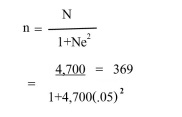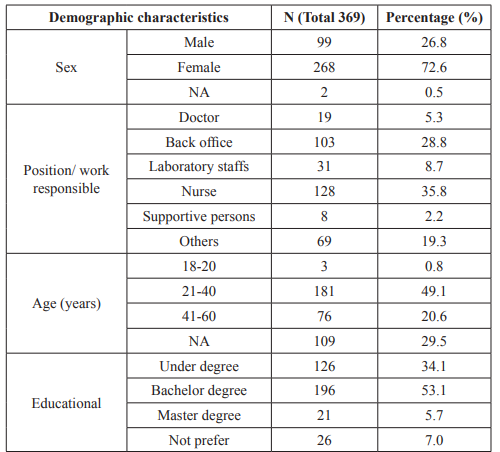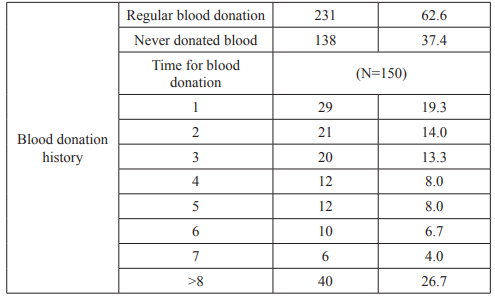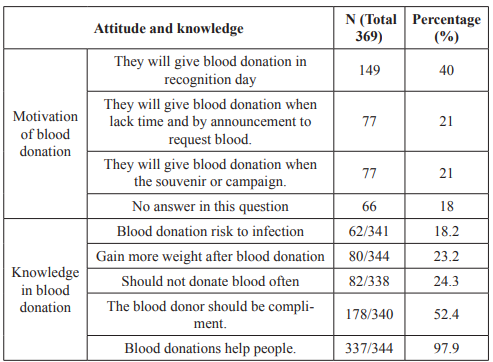The Study of Factors and Attitudes of Blood Donation in Maharat Nakhon Ratchasima's Staffs
Author'(s): Jitraporn Poyen*
Medical Scientist. Blood Donation Unit, Maharat Nakhon Ratchasima Hospital, Thailand.
*Correspondence:
Jitraporn Poyen, Medical Scientist, Blood Donation Unit, Maharat Nakhon Ratchasima Hospital, Thailand.
Received: 09 May 2020; Accepted: 11 June 2020
Citation: Jitraporn Poyen. The Study of Factors and Attitudes of Blood Donation in Maharat Nakhon Ratchasima’s Staffs. Cancer Sci Res. 2020; 3(2); 1-4.
Abstract
Introduction: Maharat Nakhon Ratchasima Hospital located in Nakhon Ratchasima Municipality, Nai Mueang Subdistrict, Mueang Nakhon Ratchasima District Nakhon Ratchasima Province Founded in 1999, is a Nakhon Ratchasima Provincial Hospital. Is the largest regional hospital in the Office of the Permanent Secretary for Health. There are a total of 1,619 beds for patients. Totally staffs are 4,669 persons with in the age between 20-60 years old. And The hospital have own Blood Bank Organization alongside and work with policy of Thai Red Cross. The blood and blood component is important for used in surgeries, blood transfusion and for clinical use. The mission of blood banks has to be the supportive threatening in hospital. By human resource of 4,699 persons; the objective of the study was to determine and evaluate the factor to affect blood donor’s behavior in Maharat Nakhon Ratchasima Hospital, Thailand.
Methods: The study is questionnaire-based and involved 369 staffs in Maharat Nakhon Ratchasima Hospital, Thailand.
Results: The data in ration of; female and male were 1.65 (268:101), used to donated blood 61.7% (228:369) a positive satisfaction level in good service 95.6% (353:369), non-remunerate or donate blood without expecting anything in return 82% (325:369).
Conclusion: Staffs in Maharat Nakhon Ratchasima Hospital have positive attitude in blood donation. And 39.1% of staffs have approach and stimulate to become register blood donor. Therefore, this research found the opportunity to get and maintain human resource in the hospital.
Keywords
Introduction
Maharat Nakhon Ratchasima Hospital is that the main hospital of Nakhon Ratchasima Province, Thailand and it is classified under the Ministry of Public Health as a regional hospital. It is the most importannt hospital in Thailand under the responsibility of the ministry and has 1,680 beds. Blood donation unit of Clinical Pathology and Medical Technology Department has a vital duty in blood provide; adequate for medical treatment and in time for surgery. And the obtained blood must be of safe and quality up to American Associated of Blood Banks [1], European (EU) and the Thai Red Cross (TRC) standard.
In sometimes the insufficient of blood stock less than usual. And relative blood donors can give to be adequate to be used at that point. Currently, the demand for blood provide within the whole country is meagerly and insufficient for the day. TRC have whole blood donation just 1,500 - 2,000 units, that should have a reserve blood of 3,000 units per day for enough to provide. In 2015, the TRC has originated the targeting the first domestic blood provide to get voluntary non-remunerate blood donor. Intira Bangsuwan studied found 92.9 percent donated because they received edges from the hospital, 41.0 percent wished a certificate from blood donation, 31 percent wished financial compensation and whereas 2.58 percent do not have any reason to donate. According to the blood donation information in 2019, it has been found that there has been a total of 57,786 blood donation units. And relative blood donations were found 914 units (replacement relatives). There is still a shortage of blood at bound times. The considering variety of hospital employee, it had been found that there have been 4,669 personnel. Blood bank should have a policy to recruit blood donors and renew to donate blood before the blood provide goes into the critical phase. And Maharat Nakhon Ratchasima Hospital has big resource personnel or staffs. It is nearby resource that can alert and invited to donate blood.
Therefore, research on factors and attitudes of internal personnel able to use information for improvement and development, throughout, also create a regular blood donor evenly and continuously within the hospital.
Objective
- To study and analyze various factors; motive for making a blood donation decision, blood donation behavior, distribution of blood group, etc.
- Use the results of the study to solve the problem of blood shortage and reducing relatives blood donors to replace blood
Research Methodology
It is a prospective study by using questionnaires to collect research data. Which is listed on the office of human resource and currently works in the Maharat Nakhon Ratchasima Hospital, total 369 persons. The questionnaire was collected between November and December 2019. The data analysis by using statistics, percentage, mean of knowledge, perception, attitude and motivation toward in blood donation.
A) The scope of the research is as follows;
Sample study Criteria for estimating sample size from population (Bun Chomsri Sa-at, 1992: 38) use the criteria; population size in each department will be sampled in the questionnaire distribution in percentage 15-30 or at least 15 people but not more than 30 people per department. By calculating the total population of 4,700 people, And want to allow sampling error of 5 percent

Data collection form or the questionnaire
The form used in this research, especially showing and requesting the use of the form from the ethics certification agency of Maharat Nakhon Ratchasima Hospital.
Research Project Leader
Research Project Leader must get the certificate of ethics exam by CITI program.
Materials and Methods
Study Area/Time
The study was carried out in Maharat Nakhon Rachasima hospital.
November to December, 2019.
Study Subjects
Any individual who has active work in the hospital and whose age between 18-60 years old.
Study Design
This is a cross-sectional, descriptive study
Sample Size
After reviewing the population size from Registration Department at the hospital, we calculated the sample.
Sample size is 369 with 95% confidence interval, alpha error of 0.05, accuracy of ± 5%, and power of 80%.
Sampling Technique
Participants for this study were selected by convenient purposive sampling technique.
Data Collection Tool
A self-created questionnaire was used for data collection. All datas was fill in excel file. It is a combination of four parts of questionnaires. The questionnaire was validated by Ethic committee of Maharat Nakhon Ratchasima. It included questions covering 10 topics: demographic data (sex, position or work resposible, age, educational) blood donation history (blood group, records for blood donation), attitude towards blood donation ( knowledge, attitude, reasons for blood donation, and motivation for donation), and satisfaction topic in blood donation services. the reasons of unclear queries and helped illiterate individual to fill within the paper properly, by the research worker. Questionnaire needed 10 minutes to be completed and stuffed questionnaires were collected.
Study Variables
The questionnaire contains the following groups of variables:
- The demographic characteristics of the
- Blood group distribution and blood donation
- Attitude towards blood
- Satisfaction in blood donation
Data Management and Analysis Plan
The Statistical Package for Social Sciences (SPSS version 20) was used for data entry and qualitative and quantitative statistical analysis. The descriptive statistics (frequency and percentage for categorical data during median and mean ranks for knowledge score) were computed.
Regarding knowledge score, right answers were given score “1” while wrong answers and do not know answers were given score “0.” Thus, the total knowledge score ranged between 0 and 5 while, for attitude score, the responses were scored in a way that the higher the score the more positive the attitude towards blood donation. Strongly agree was given a score “5,” agree “4,” neutral “3,” disagree “2,” and strongly disagree “1.” Thus, the total attitude score ranged between 4 and 20.
Ethical Considerations
Maharat Nakhon Ratchasima Ethic committee was approved.
Results
The demographic characteristics of the participants
The personal information during the period of study found the subjects was female 72.6% (268/369), male 26.8% (99/369 and not available answer for sex 0.5% (2/369). The position or job responsible were doctor, back office, laboratory staff, nurse and supporter staffs, the percentage found 5.3%, 28.8%, 8.7%, 35.8%, 2.2% and 19.3%, respectively. Age divided into four groups; found; age 18-20, 21-40, 41-60 years old and not available found 0.8%, 49.1% 20.6% and 29.5%, respectively. The educational level; under degree, Bachelor degree, Master degree and not prefer were found; 34.1%, 53.1%, 5.7% and 7.0%, respectively. Their demographic characteristics are presented in Table 1.

Table 1: The demographic characteristics of the participants in the study.
Blood group distribution and blood donation history
The frequency of blood group distribution in this study found 91% were known their blood group phenotype. And divide into A,B,O and AB were 23.6%, 30.6%, 27.6% and 8.9%, respectively. The 62.6 % of the participants ever been to be blood donor. The 37.4% never been blood donation. The time for blood donation is 1 to 7 and > 8 were 19.3%, 14.0%, 13.3%, 8.0%, 8.0% 6.7%, 4.0% and 26.7% (Table 2).


Table 2: The demographic characteristics of blood group phenotypes and blood donation history.
The attitude towards blood donation
The attitude towards blood donation in this study concern with the motivation to drive the staffs to be blood donors; (1) the special day (such as birthday, recognition day, cerebration day). (2) The announcement to ask for the blood from Blood Bank. (3) The souvenir or campaign in season for blood donation. The study shown 40% will give blood donation in special day or recognition ceremony. The announcement to ask for the blood or blood lack provide will encourage the staffs to give blood donation 20%, and 23% will be blood donors when they know or interest in the souvenir or campaign. Knowledge in blood donation were consider in two important topics as the blood donation risk to infection and the blood donor will gain more weight after donation, the data was shown 18.2% feel he blood donation risk to infection. And 23.2% feel gain more weight after donation. Also in others questionnaire were shown in table 3.

Table 3: The attitude towards blood donation.
Satisfaction in blood donation service
The satisfaction question evaluates in (1) satisfaction in the blood bank 's staffs service, (2) information and convenient in the service,(3) safe and feel comfortable in the service. The table 4 will be describe for the satisfaction information.

Table 4: Satisfaction in blood donation service.
Discussion and Conclusion
As the data was shown, we see that the staffs or the employee in Maharat Nakhon Ratchasima Hospital has been regular blood donor for 62.6%, the estimate from total employee show 2,941 persons will come to be blood donation. Then Blood Bank should plan to keep and recruit this group to continue blood donation every three months, and keep contact with them to let they know the blood providing situation. In the same time the positive attitude in blood donation and service is high (around 95-97%). In other hands 37.4% of staffs have approach and stimulate to become register blood donor and set up the protocol to make sure and clearly with the person who still unclear about the safety in blood donation. Therefore, this research found the opportunity to get and maintain human resource in the hospital.
References
- Standard for blood banks and transfusion services. 30th ed. Bethesda MD AABB. 2016.
- National Blood Service Center. Thai Red Cross Society. National Blood Service Policy. Bangkok National Blood Service Center, Thai Red Cross. 2010.
- Anong Srisimsiri. Factors Affecting the Intention of Blood Donation of People in Narathiwat Master of Science Thesis. Yala Rajabhat University. 2012.
- Saithong Wongkham. Factors Affecting Blood Donation of Blood Donors at Blood Bank Hua Hin Hospital. Academic Service Journal Prince of Songkla University. 2016; 26: 83-94.